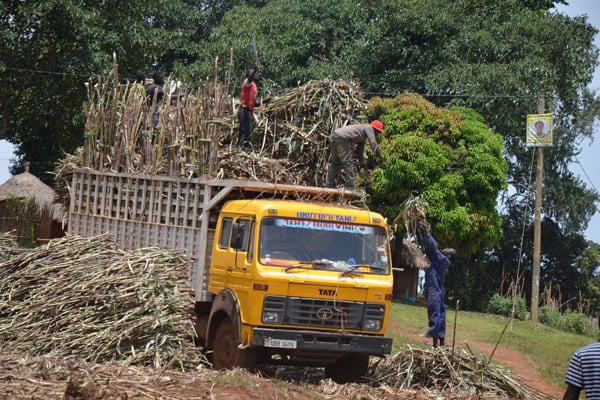Mixed reactions as Sugar Bill gets first reading in Parliament

A truck carrying sugarcane in Jinja recently. PHOTO/TAUSI NAKATO
What you need to know:
- The Council will be composed of representatives of stakeholders in the sugar industry, and will include a chairperson and four representatives from the sugarcane growers and a similar number from the millers.
- The Permanent Secretaries or representatives from the Ministries of Agriculture, Finance and Trade will also sit on the Council but will not possess voting rights.
The Sugar Amendment Bill (2023) has evoked mixed reactions from stakeholders, days after it was tabled on the floor of Parliament.
The Minister of State for Trade, Industry, and Cooperatives, Mr David Bahati, on December 5, presented the Bill for its first reading during the plenary sitting.
This was after the Speaker Anita Among referred it to the Parliamentary Committee on Trade, Industry and Tourism to make consultations from all stakeholders, including farmers and millers within 45 days, and give a recommendation to the House for resolution to be passed after proper scrutiny.
The Bill seeks to amend the Act to establish the Uganda Sugar Industry Stakeholder Council, which will replace and inherit the duties of the Sugar Board created by the Sugar Act (2020), all aimed at regulating the sugar industry in the country.
Section 13 of the Sugar Act established the Sugar Board as the body responsible for implementing the Act; however, the Board could not be established because of the government policy on rationalization, which restricts the establishment of statutory bodies.
The Council will be composed of representatives of stakeholders in the sugar industry, and will include a chairperson and four representatives from the sugarcane growers and a similar number from the millers.
The Permanent Secretaries or representatives from the Ministries of Agriculture, Finance and Trade will also sit on the Council but will not possess voting rights.
Reactions
The Chairperson of Uganda Sugarcane Growers’ Association (USGA), Mr Isa Budhugo, has, however, expressed reservations, saying the Council will not be independent if it is funded by the millers. According to him, it is equivalent to “having nothing”.
“If the government cannot fully fund the regulatory body, we better leave it because they will be passing resolutions that are in their favor,’’ he said in an interview on Tuesday.
According to the Bill, the Council’s funding is proposed to come from a sugar levy imposed on millers. However, the government will not fund activities of the Council, which include; extension services, marketing, research and development, among others.
Mr Budhugo described the composition of the Council members as “unfair” because the Chairperson is appointed by the minister.
He adds: “According to the Bill, the Chairperson of the Council must be appointed by the Minister, yet we want an Electoral College where we appoint a Chairperson within ourselves on a rotation basis.”
In justifying the above statement, Mr Budhugo says, for example, if the farmer is appointed Chairperson, when his or her term of office expires, they elect a miller.
The Bill also seeks to amend and align the formula to determine sugarcane prices sold to millers in accordance with international norms.
The International sugar sector is governed by a price formula that determines the sharing of proceeds between the millers and growers. The formula basically sets the minimum prices for negotiations between the two parties.
However, Mr Budhugo says the formula needs extensive research and impact assessment before being adopted, adding that farmers prefer prices to be determined by market forces.
He says formulas are “outdated”, “violate competitiveness” as emphasised in a market economy, and are summarily “unfair in this competitive world”.
Mr Musa Kabugo, a farmer, says: “Millers are the ones to benefit, while farmers are going to be cheated because most of us are uneducated, and can’t understand those formulas. We are used to the current pricing which is determined by the forces of demand and supply.”
Mr David Mombwe, the General Secretary Busoga Out growers Association (BSGA), says the issue of zoning should be excluded in the new Bill.
Currently, Busoga Sub-region has six sugar factories, including; Kakira Sugar Works, Mayuge Sugar Factory, Kamuli Sugar Ltd, Kaliro Sugar Ltd, Bugiri Sugar Ltd and GM Sugar Factory.
The millers, however, want zoning of a 25-kilometer radius between mills, with not more than one mill in a zone having out growers in that area supplying sugarcane to it.
Through their body, the Uganda Sugar Manufacturers’ Association, the millers on July 17 petitioned Parliament, expressing what they termed “an unfair trend of licensing new sugar factories”, which they contended was contrary to the Sugar Act, and National Sugar Policy.
In their letter signed by their Chairperson, Mr Jim Kabeho, the millers said licensing powers should be undertaken by the Ministry of Trade, Industry and Cooperatives, not the Council.
However, Mr Mombwe, says: “Busoga Sub-region should be given more factories because, as farmers, we have the capacity to supply them (millers) cane.”
He adds: “It is not a right decision for millers to bring in the zoning issue; a farmer in Namutumba district will not be able to transport his or her cane to Kakira because of fuel costs.’’
Mr Mombwe says between 2017 and 2021, they had surplus cane and the prices went down; however, the government helped them to supply some of their cane that was drying up in the gardens to Kenya and Atiak in Northern Uganda.
“No factory has the capacity to crush all the cane within a 25-kilometers radius,” he says.
Mr Godfrey Biriwali, the Chairperson Great Busoga Farmers’ Union, wonders why the government should zone sugarcanes when other crops are not zoned. “We are in a liberal economy; so, let everybody look for the market wherever they want,’’ he says.




